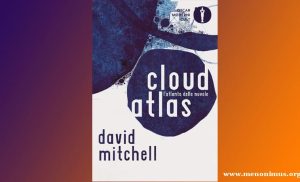Cloud Atlas | David Mitchell | A Review
Cloud Atlas by David Mitchell-A Review
David Mitchell’s “Cloud Atlas” is an intricately woven literary masterpiece that transcends traditional narrative structures and takes readers on a mesmerizing journey across time, space, and the interconnectedness of human experience. Comprising six distinct but interlinked stories, the novel explores profound themes of reincarnation, the ripple effects of human actions, and the eternal struggle between oppression and liberation.
Narrative Structure:
The most captivating aspect of “Cloud Atlas” is its unique narrative structure. Mitchell crafts a narrative tapestry by presenting six stories that span various time periods, from the 19th century to a distant post-apocalyptic future. These stories are nested within one another, forming a Russian doll-like structure that draws readers into a web of connections.
Themes of Reincarnation and Interconnectedness:
At the heart of “Cloud Atlas” lies the theme of reincarnation, where souls traverse different lives and eras. Each of the six stories portrays a different incarnation of the same souls, emphasizing the cyclical nature of existence. This theme speaks to the enduring human spirit, suggesting that the same conflicts and yearnings persist across time.
The concept of interconnectedness is brilliantly explored through the characters’ actions rippling across generations. A deed committed in one story echoes through the ages, affecting characters in seemingly unrelated tales. This thematic thread underscores the idea that human choices have far-reaching consequences, reinforcing the novel’s central message about the impact of our actions on the world.
Variety of Genres and Styles:
Mitchell’s versatility as a writer shines through in his ability to seamlessly shift between genres and writing styles for each story. From the historical diary of a young lawyer in the 19th century to the futuristic dystopia narrated in a post-apocalyptic dialect, each tale is a showcase of Mitchell’s skillful craftsmanship and literary range.
Social and Political Commentary:
The novel delves into social and political issues across different time periods, highlighting the perpetual struggle for power and freedom. It presents a damning critique of human greed and exploitation, revealing how institutions maintain control over individuals and societies. The stories explore the tension between individual autonomy and societal constraints, encouraging readers to reflect on their own roles in shaping the world.
Characterization and Identity:
Mitchell’s characters are intricately developed, with each incarnation displaying unique qualities while still bearing a recognizable essence. This characterization underscores the novel’s theme of continuity amidst change, as well as the question of whether individuality transcends the boundaries of time.
Language and Prose:
Mitchell’s prose is poetic and evocative, adapting to the distinct settings and tones of each story. The language captures the nuances of different time periods and cultures, immersing readers in the worlds he creates. The linguistic diversity across the stories is a testament to the author’s linguistic prowess.
Conclusion:
“Cloud Atlas” is a literary marvel that challenges conventional storytelling and explores profound philosophical and existential themes. Through its intricate structure and thematic depth, it invites readers to contemplate the threads that connect humanity across time and space. David Mitchell’s ability to intertwine diverse genres, characters, and ideas into a coherent narrative showcases his mastery as a writer. This novel is not just a book, but an experience that leaves an indelible mark on the reader’s mind, urging them to ponder the vast tapestry of human existence. 0 0 0.
Cloud Atlas David Mitchell A Review
N.B. The article originally belongs to the book entitled ‘The Reviews of Epic Literature Around the World‘ by Menonim Menonimus.
You May Like:








